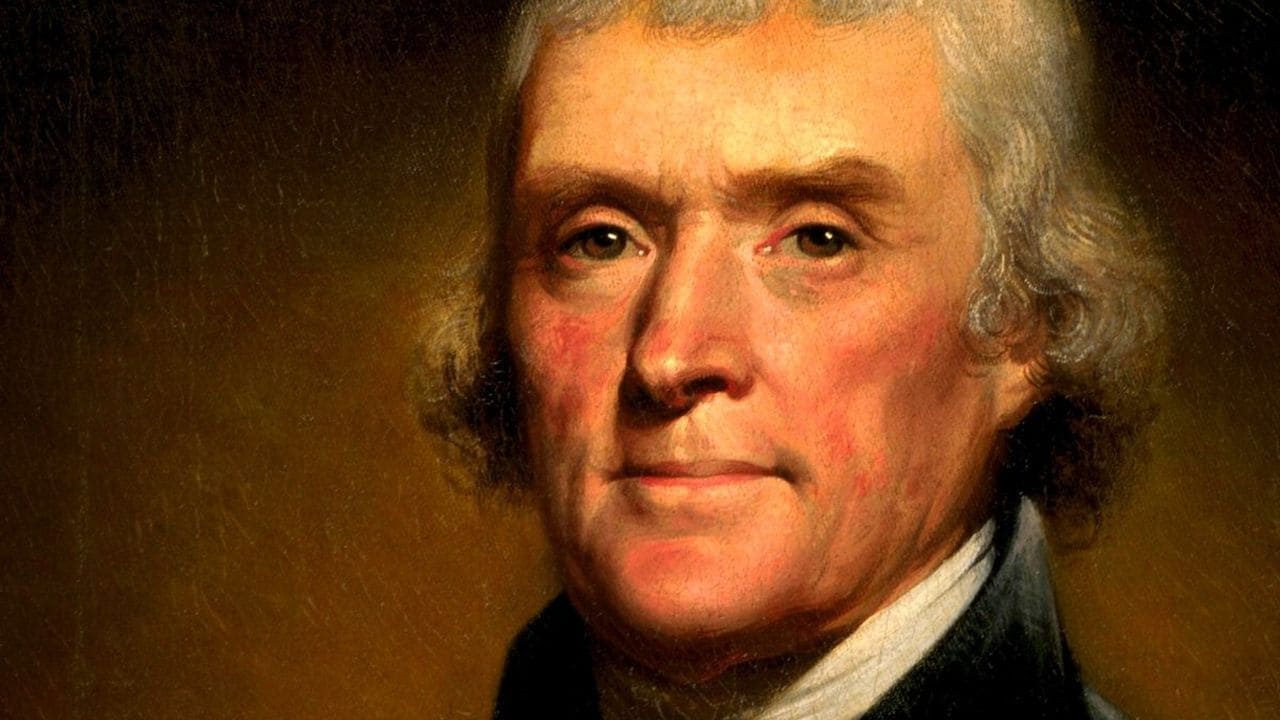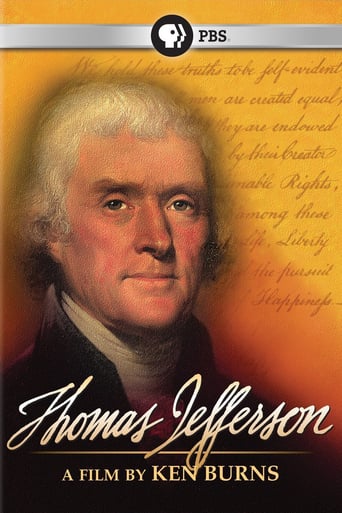



Very interesting film. Was caught on the premise when seeing the trailer but unsure as to what the outcome would be for the showing. As it turns out, it was a very good film.
View MoreIt isn't all that great, actually. Really cheesy and very predicable of how certain scenes are gonna turn play out. However, I guess that's the charm of it all, because I would consider this one of my guilty pleasures.
View MoreIt is interesting even when nothing much happens, which is for most of its 3-hour running time. Read full review
View MoreThe film may be flawed, but its message is not.
In reading this review I find myself asking what this viewer is really looking for. In one voice we are told the production show Jefferson "warts and all" and in the next appears to condemn the work for showing he was a Southern with slaves and that his relationship with those slaves (i.e. Sally Hemings) and his animosity towards other "Founding Fathers" as inappropriate at the least and cruel at the worst. This viewer states more of Jefferson's own words should have been used - which would have been wonderful, but if this viewer truly knew Jefferson's history, this viewer would also know that Jefferson destroyed nearly everything he had ever written about or two anyone along with nearly everything anyone wrote to him. Therefore we can only piece together a picture of this man by others of the period who wrote "about" him, not necessarily to him as well as records found in France, England and our own Archives. An American who wishes to examine American history is hard pressed to find the facts which would make our history clear and easy to understand and perhaps that is for the better as it forces us to look closely and most of all to think.
View MoreI am an Asian Indian. I think America is a successful experiment. I like almost all the people who played any role in kicking Britishiers out of America. I watched this film with only one information about Thomas J that he wrote Decration of Independence. This documentary talks about a lot of stuff. After watching this documentary I am convinced that personally he was an average man who liked women, prawns, palatial houses, money, freedom from family, wine basically anything which can be considered material gain. Still It can not be ignored that he separated state from the church and had ideas of about university for learning. A man who owned slaves and thought they were inferior, conspired against Indians, came into power claiming John Adam stood for despotism and became a despot by putting embargo on the ships. I owe this to Ken Burns for bringing out the real contradictions and negatives and positives of this very celebrated dwarf. Andrew Burnstein should try his luck in drama. He is damn funny with his extra emotional tone for a slave owner who made a fool of common people by feeding them 'Liberty' and reached the highest office . Gore Vidal is right in saying that if there is any American spirit then its him. American spirit is just the same as Indian, Ethiopinan, Pakistani or Chinese spirit which is to say something else and do something else. No idea why people are confused with his contradictions. He was just a regular politician with a fantastic timing. As John Hope says "he is a blessing and a curse". Thomas J was a blessing when he represented Dr Jekyl and was a curse when he was Mr Hyde. Its nice that people and circumstances brought Dr Jekyl out of this Mr. Hyde. Thanks to intelligent people of that time. Great Documentary. A must watch. 9/10.
View MoreFrom the opening use of the tortured Hamlet, Ken Burns documentary on Thomas Jefferson paints an enigmatic portrait of self-contradiction. The first half of the film focuses on his younger years leading up to his presidency. The film presents a fascinating illustration of a young man that attended the College Of William & Mary, studying 15 of 24 hours per day en route to his early beginnings as a law apprentice. Highlighted are the many personal setbacks Jefferson experienced: the deaths of his parents, in-laws, most of his children, and eventually his wife before he reached age 40. It details the construction of the Declaration Of Independence, which Jefferson wrote. One astonishing sequence shows the progress Jefferson made in writing it, complete with crossed out phrases and corrections provided. The commentators note that Jefferson wrote nothing short of an abstract assertion of tenets that touched all of us on a basic human level. His years in Paris touch on his longing to be reunited with his daughter and a love affair with Maria Cosway, a British cultural aesthete. Jefferson was present in Paris at the dawn of the French Revolution and then finally he returned to Monticello.His presidential years were marked by the contradiction of the expansion of individual freedom and the exclusion of that freedom for certain groups: namely, Native Americans and Blacks. Jefferson was responsible for the Louisiana Purchase, yet encouraged the removal of Native Americans from the east to the west. Jefferson owned slaves, many of them inherited from his father-in-law, but introduced or pushed no less than a dozen pieces of legislation to emancipate slaves long before he became president. One effort fell heartbreakingly short by a single vote in 1780! Imagine what a different country we might have had, if this was accomplished at that time. The film draws Jefferson as a family man, scientist, and scholar, who was disinterested in politics and being a statesman. Yet Jefferson became the very first Secretary Of State and the third President, and is mostly remembered by all for being a President. However, Jefferson himself valued his founding of the University Of Virginia, his writing of the Virginia Statutes, and the Declaration as his greatest accomplishments. His later years were marked by more personal tragedies, financial ruin, gardening, house parties, and more reading and studying. His library consisted of over 6,000 books! Perhaps the historically significant thing about his later years was the renewal of his friendship with our second President, John Adams, in the form of correspondence. The incomplete building of Monticello is a metaphor for Jefferson's life really. He was, what we would call today, fundamentally a life-long student; he was always growing and learning. The film is reverential in tone, with solemn musical interludes, and praiseworthy commentary from historians. It raises no questions and provides no answers really; it just presents Jefferson's life in straight-forward fashion. It does not avoid the difficult issues, but neither does it tackle them in great depth completely. That would be taking us away from the subject, which is Jefferson. ***1/2 of 4 stars.
View MoreKen Burns and company do an excellent job of giving us the whole Jefferson, warts and all. But one begins to wonder why they didn't do a documentary about someone else of the times, someone who didn't own slaves, didn't deport all Eastern Indians to the West, didn't build a museum for his personal abode, didn't praise the French Revolution in the most immoderate terms and didn't sink deep into debt. Whether he impregnated slave Sally is almost tangential and immaterial. He "did" so many other things! It is often said, one shouldn't judge a historical figure by today's exacting standards. Yet it is also said, by those same people, that time must pass to allow us to objectively evaluate today's leaders. And as if this weren't enough, one also hears these souls denounce "moral relativism". Go figure. But one needn't judge Jefferson by today's "politically correct" standards. One can be content with judging him by his own time's and, indeed, by his very own standards. And, one can emulate his own extremely harsh judgments of fellow founding father Alexander Hamilton. It's disrespectful to the founding fathers not to judge them. They judged each other, and they wanted to be judged. This good documentary is marred by interruptions from overexposed, self-important pundits from all corners of the vaunted political spectrum, a common documentary flaw. Interpretation and opinion should be served on a separate plate - please! A little more verve and humor would have added spice and made for a less reverential opus. Jefferson wrote so many letters. There should have been more quotations from the horse's mouth.
View More